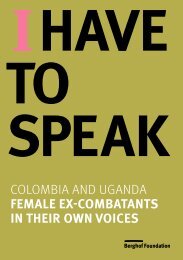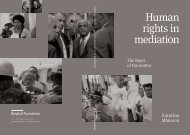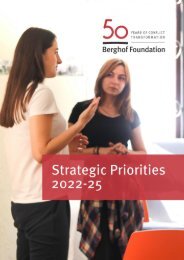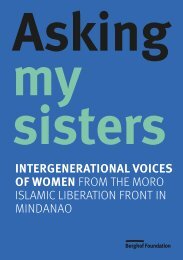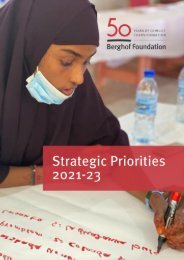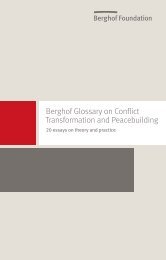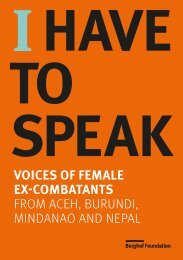Berghof Foundation: 50 years of conflict transformation
This book provides an overview of the Berghof Foundation’s work and impact over the past 50 years and sheds light on the challenges ahead of peacebuilding.
This book provides an overview of the Berghof Foundation’s work and impact over the past 50 years and sheds light on the challenges ahead of peacebuilding.
You also want an ePaper? Increase the reach of your titles
YUMPU automatically turns print PDFs into web optimized ePapers that Google loves.
Addressing the<br />
long legacy <strong>of</strong><br />
violent pasts<br />
History<br />
memory<br />
reconciliation<br />
One might venture to say that no German<br />
organisation with a mission to build peace and<br />
transform <strong>conflict</strong> can do so without a firm rooting<br />
in lessons on how to rebuild from a violent past.<br />
When the <strong>Bergh<strong>of</strong></strong> <strong>Foundation</strong> was established in<br />
1971, it was in part a response to knowing about<br />
the devastation that war brings, and the ensuing<br />
responsibility to find better, nonviolent ways. In<br />
his memoirs, the <strong>Bergh<strong>of</strong></strong> <strong>Foundation</strong>’s founder<br />
Georg Zundel writes: “The violent confrontation<br />
<strong>of</strong> the Second World War, which took place during<br />
my childhood and youth, had a decisive impact on<br />
me. It resulted in my resistance to rearmament,<br />
my involvement in the anti-nuclear movement and<br />
finally the establishment <strong>of</strong> the <strong>Bergh<strong>of</strong></strong> <strong>Foundation</strong><br />
for Conflict Research. [...] Our youth today lacks<br />
such experiences. It therefore seems to me to be<br />
<strong>of</strong> the utmost importance to raise awareness <strong>of</strong><br />
the <strong>conflict</strong>s smoldering in society and to work out<br />
strategies that will make it possible to resolve these<br />
<strong>conflict</strong>s peacefully.”<br />
It is practically in the <strong>Bergh<strong>of</strong></strong> <strong>Foundation</strong>’s<br />
DNA to engage conceptually and practically with<br />
the role <strong>of</strong> the past in <strong>conflict</strong> <strong>transformation</strong>, even<br />
if it has not always dominated the topical headlines<br />
<strong>of</strong> our work over the decades. In recent <strong>years</strong>, from<br />
peace education to peace mediation, it is becoming<br />
apparent just how essential it is to understand the<br />
history <strong>of</strong> past violence and its representation in the<br />
present in order to peacefully transform <strong>conflict</strong>.<br />
Writing in 2021, dealing with the past, reconciliation<br />
and, indeed, transitional justice are all highly<br />
differentiated fields <strong>of</strong> expertise. At their core,<br />
however, the <strong>transformation</strong>al challenge is the<br />
same for all: how to rebuild relationships, and trust,<br />
between individuals, between communities, and<br />
between citizens and their state(s). The remainder<br />
<strong>of</strong> this short essay therefore highlights some <strong>of</strong><br />
the key encounters — the memory <strong>of</strong> three lasting<br />
relationships — that have affected, and continue to<br />
inspire, our approach.<br />
From 2005 to 2008, the then <strong>Bergh<strong>of</strong></strong><br />
Research Center Director David Bloomfield — from<br />
Belfast, Northern Ireland — shaped a commitment<br />
to practicality, pragmatism and critical distinction.<br />
His seminal report On Good Terms in 2006 talks<br />
about ‘political reconciliation’: “This does not require<br />
forgiveness or mutual love. It begins as grudging<br />
coexistence and, by gradually nurturing basic respect<br />
both for new institutions and for former enemies,<br />
aims to develop the habits <strong>of</strong> operating the shared<br />
processes and institutions <strong>of</strong> society and <strong>of</strong> politics.”<br />
This chimes today, for example, with our work in<br />
Somalia on reconciliation dialogues.<br />
In 2007/2008, Israeli Pr<strong>of</strong>essor Dan Bar-<br />
On spent time as a guest researcher at the <strong>Bergh<strong>of</strong></strong><br />
Research Center, and instilled the importance <strong>of</strong><br />
clear questioning, engagement within each side<br />
in <strong>conflict</strong> and the painstaking work <strong>of</strong> trust and<br />
confidence-building. <strong>Bergh<strong>of</strong></strong> Handbook Dialogue 11<br />
on transforming war-related identities is dedicated<br />
to his memory. The history textbook <strong>of</strong> Israeli and<br />
Palestinian parallel memories, Side by Side — a prime<br />
example <strong>of</strong> peace education, which a team at <strong>Bergh<strong>of</strong></strong><br />
translated into a German workbook — exemplifies<br />
the complexity <strong>of</strong> historical memories and their<br />
interface with education and peacebuilding. His work<br />
resonates to this day in our approach to biographical<br />
storytelling and history dialogues in the Caucasus.<br />
A final relationship serves to underscore<br />
the transformative potential <strong>of</strong> being moved by<br />
remarkable stories and people. In 2006, Jo Berry<br />
and Patrick Magee visited the <strong>Bergh<strong>of</strong></strong> Center, then<br />
located in the quaint green surroundings <strong>of</strong> Berlin’s<br />
Dahlem district. Pat Magee, an IRA member, had<br />
planted the bomb in the Grand Hotel in Brighton<br />
that killed Jo’s father, a British Conservative MP,<br />
in 1984. They have opened their encounters and<br />
dialogues <strong>of</strong> forgiveness to the public, and back then,<br />
a <strong>Bergh<strong>of</strong></strong> audience witnessed the remarkable force<br />
<strong>of</strong> reconciliation in the making: an uneasy, fragile and<br />
powerful example <strong>of</strong> peer learning.<br />
In the decade beginning in 2021, Dealing<br />
with the Past explicitly makes it to the forefront <strong>of</strong><br />
our strategic agenda <strong>of</strong> practice, education and<br />
research. Whether in Georgia-Abkhazia, Ethiopia,<br />
Somalia, Germany or other settings, our work<br />
on dealing with the past emphasises community<br />
perspectives on justice and reconciliation after<br />
violence, recognising the empathy and strength as<br />
well as the pragmatism and humility required. We<br />
take a keen interest in history dialogues and the role<br />
<strong>of</strong> history narratives, divisive or uniting, in mediation<br />
and dialogue at the political level.<br />
116<br />
117





